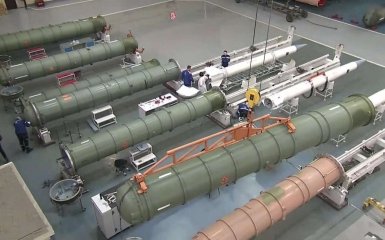According to Andrii Yusov, a representative of the Main Directorate of Intelligence of the Ukrainian Ministry of Defense, the criminal army of the Russia has no stockpiles of precision missiles, and the newly manufactured ones are immediately used to attack Ukraine.
What is known about Russia's problems with missiles
Yusov noted that the Russian defence industry is currently unable to restore the pre-war stockpiles of missiles of the aggressor country.
This is how the representative of the Defence Intelligence of Ukraine (DIU) commented on a story by the German TV channel Welt about Russia's alleged readiness to reach production volumes of up to 200 missiles per month this year.
German journalists also claimed that the Russian defence industry had allegedly reached a production capacity of 2 million large-calibre munitions per year.
If we are talking about stockpiles of missile weapons, in particular, conventionally "high-precision" ones, as they call them, then everything they produce is actually used immediately to continue this criminal war against Ukraine. They cannot reach the pre-war level of stockpiles for a full-scale invasion. But they still have a significant potential, and of course, this poses a danger to Ukraine and requires additional support measures to (protect) Ukrainian skies, air and missile defence systems," Yusov explains.
He stressed that the defence industry of the aggressor country is currently trying to increase the production of various types of missiles.
Although the plans differ from the results. But they certainly contain a certain strengthening of the defence complex," Yusov admits.
How Russia manages to circumvent Western sanctions to obtain components and manufacture weapons
According to Politico journalists, the Kremlin has adapted to the sanctions imposed by Western countries and found ways to circumvent them and obtain the components and technologies needed to produce weapons.
The authors of the article emphasise that Western countries should improve and strengthen sanctions mechanisms.
In particular, imports of dual-use goods to Russia from January to October 2023 totalled almost $9 billion, which is only 10% less than in the pre-war period.
Russia needs microchips, sensors and navigation systems to replenish its stockpile of weapons, such as Kinzhal hypersonic missiles or reconnaissance and strike drones, including Shahid, the authors note.
It is emphasised that over the past year, Russia has managed to increase its missile and UAV production capacity.
According to Ukraine's estimates, Russia's missile production capacity in 2022 was 50 units per month, doubling to 100 by mid-2023 and reaching 115 by the end of the year.
It is noted that the gap between Russia's consumption of missiles and its ability to replace them with its own production has pushed Moscow to use North Korean ballistic missiles in Ukraine. The Kremlin is also seeking to get more from Iran.
Although Ukraine's partners have imposed sanctions on many Western components, 2,800 of them have been found in the wreckage of Russian weapons on the battlefield. In the first 10 months of 2023 alone, Western companies supplied 48% of such combat components, which exceeds the 45% accounted for by China, journalists note.
They add that US semiconductor giant Intel tops the list of manufacturers of military goods received by Russia, followed by China's Huawei. The top 10 also includes American Analog Devices, AMD, Texas Instruments, IBM and Dell.
In terms of countries where components are sold and shipped, China and Hong Kong are the dominant suppliers. Russia has managed to reorient its supply chain. Other leading channels are Turkey and the UAE.



